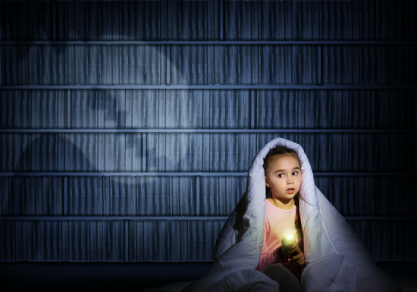|
Nighttime fears are common in young children and can result in frustrated and exhausted parents. Sound familiar? How can we help our children overcome their fears and to fall asleep peacefully?
Points to consider:
Now of course there has to be limits. Although a child suggesting that “you can stay with me until I fall asleep” or “I can sleep in your bed” may be acceptable for some families, if it is not appropriate for your family then you might gently say “hmm that’s a good idea but that won’t work for me because I have some things I need to do” or “that’s a good idea but that might be a bit squishy and I get pretty grumpy in the morning if I don’t get a good night’s sleep!”. Listen to your child’s ideas and build on them if you need to until you come up with a satisfactory solution that works for both of you. Validating the emotion and supporting children to come up with constructive solutions increases emotional intelligence. It helps them to regulate emotions and gives confidence that they have the power to make themselves feel better. If your child is having chronic sleep disturbances or the anxiety escalates and interferes with daily functioning then you might like to consider consulting with a child psychologist for assistance. It may not be too long before everyone is back to getting a good night’s sleep! Comments are closed.
|
Categories
All
|
Hopscotch & HarmonyAt Hopscotch & Harmony Psychology, you can expect compassionate care and evidence-based guidance on your journey to wellness.
With clinics in Werribee and Belmont, as well as providing online counselling to clients who live throughout Australia, our dedicated team of psychologists and dietitians are committed to providing support to children, teenagers and adults. With a focus on understanding your unique needs, we offer tailored solutions to foster growth and resilience. Trust in our experience and dedication as we work together towards your well-being. Welcome to a place where healing begins and possibilities abound. |
Our services |
Contact usHopscotch & Harmony
Child, Teen and Adult Psychology Our Locations:
WERRIBEE: 1/167-179 Shaws Rd
BELMONT: 92 Roslyn Rd AUSTRALIA-WIDE: Online counselling |
Hopscotch and Harmony respectfully recognise the Aboriginal and Torres Strait Islander people as the first Peoples of the continent now called Australia.
We acknowledge the Bunurong and Wadawurrung people of the Kulin Nation, the traditional owners of the land on which we work, and pay our respects to their Elders, past, present and emerging.
© 2024 Hopscotch and Harmony Pty Ltd


 RSS Feed
RSS Feed
